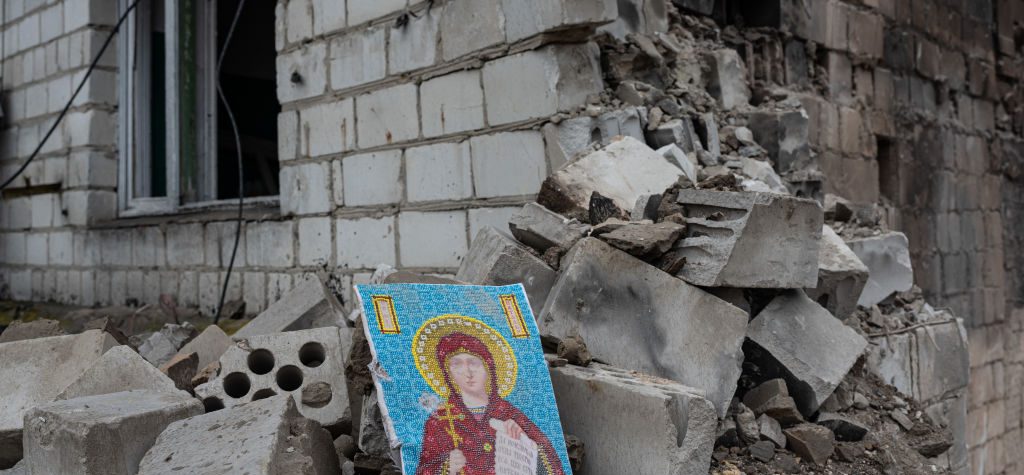We knew Russia’s invasion of Ukraine would be savage before it was even launched. Western intelligence sources anticipated that the Russians would enter Ukraine with “kill lists” of potential sources of trouble, who were to be rounded up and dealt with in order to render the country easier to rule. Regrettably, this has come to pass.
This was the plan even when the Russians thought their invasion would last just a few days. When the war began, and things started to go wrong for Russia, the viciousness found other outlets.
Points of resistance were bombed to pieces. Civilian targets across Ukraine were hit with bombs and missiles. Civilians were deported deep into Russia through a network of depersonalising “filtration camps”. When Russians later retreated from their occupation, advancing Ukrainian forces met evidence of mass executions in their wake.
The mass graves in Bucha, near the Ukrainian capital, made calling Russia’s war a genocide more common and, according to many, more obvious. They said Putin’s Russia wished to erase Ukraine as a political and national idea, to ‘Russify’ its inhabitants: by killing some, deporting more and re-educating others.
I travelled to Ukraine to investigate the question and to gather evidence. My think tank, the New Lines Institute (along with the Raoul Wallenberg Center), has experience of investigating allegations of genocides such as that of the Rohingya in Burma and the Uyghurs in Xinjiang.
The report we produced on the allegation of genocide in Ukraine involved language experts, who used primary source evidence; analysts of open source intelligence (OSINT), whose work has been vital in this war; and legal specialists and scholars of genocide, who were able to compare the data gathered to statute, to history, and to the 1948 Genocide Convention. Their conclusions are damning.
Putin’s Russia has sought to deny the existence of a Ukrainian nation and identity – in the words of the Genocide Convention, “a national, ethnical, racial or religious group”
In July 2021, Putin published an essay “On the Historical Unity of Russians and Ukrainians,” claiming that Russians and Ukrainians are ‘one people, a single whole’ and that ‘modern Ukraine is entirely the product of the Soviet era’, that ‘true sovereignty of Ukraine is possible only in partnership with Russia’.
Russian political figures denied that Ukraine has its own language and its own culture. Vladislav Surkov, the éminence grise of Putin’s Russia, and for years the architect of Russia’s war in Ukraine, said on February 26: “there is no Ukraine. There is Ukrainian-ness. That is, a specific disorder of the mind … there is no nation”. This prepared the ground for the crimes that followed.
Once the war began, Russia attacked the arteries of the Ukrainian nation. It attacked infrastructure (water, energy, and communications) and healthcare in besieged cities. Russian forces seized granaries and expropriated food from Ukrainian stores, sending much of it to Russia. This has uncanny echoes of a previous famine in Ukraine, the Holodomor of Soviet times, in which grain was redirected as Ukrainians starved.
Alongside this came a campaign of mass killing. The most salient example is Bucha, where hundreds of bodies were uncovered. Eyewitness testimony says that Ukrainians were rounded up for their previous military service, or loyalty to the Ukrainian state. Russia has also conducted kidnapped and murdered Ukrainian civic officials, including local mayors — in a bid to co-opt or to subvert civilian authority linked to continuing Ukrainian nationhood.
Distressingly, this war has seen systematic and institutionalised sexual violence. Russian rape of Ukrainian women is a weapon of war, and also a form of genocidal population control. Ukraine’s chief prosecutor has collected incomplete lists of pregnancies resulting from rape by Russian soldiers.
Rape in war which is intended to so traumatise victims that they do not seek to have their own children is also considered genocide. Ukraine’s ombudsman Lyudmyla Denisova has said that Russian soldiers explicitly told women and girls whom they made sexual slaves that the soldiers “would rape them to the point where they wouldn’t want sexual contact with any man, to prevent them from having Ukrainian children”.
Accompanying all of this has been mass deportation of Ukrainians from their homes. Conservatively, this movement of Ukrainians into Russia has included hundreds of thousands, including (it’s claimed) 180,000 children, according to Russia’s defence ministry. Ukrainians have been dispersed around Russia to prevent them coalescing under Ukrainian identity. Ukrainians deported to Russia have been given compulsory lessons in Russian. Legation has been proposed to fast-track the adoption of Ukrainian children by Russian citizens. At a minimum this is ethnic cleansing – and it is likely worse.
War crimes have been attributed to specific Russian units. Crimes of this sort are widespread among Russian forces. Reports indicate that the war is being closely micromanaged by President Putin. The highest authority in the Russian state has sanctioned these actions. The evidence for genocide is significant and growing.
The countries of the world have responsibilities to prevent and punish genocide, to which they are bound by treaty. These are worth discussing. It is vital that other scholars and international bodies take up the case.
What’s happening in Ukraine goes beyond the ordinary of an aggressive war. The evidence bears out Ukrainian claims that they are facing an actual or potential genocide. The world must decide how to respond.
Dr Azeem Ibrahim is the Director of Special Initiatives at the New Lines Institute for Strategy and Policy in Washington DC and author of the forthcoming book Authoritarian Century: Omens of a Post-Liberal Future (Hurst: 2022)


